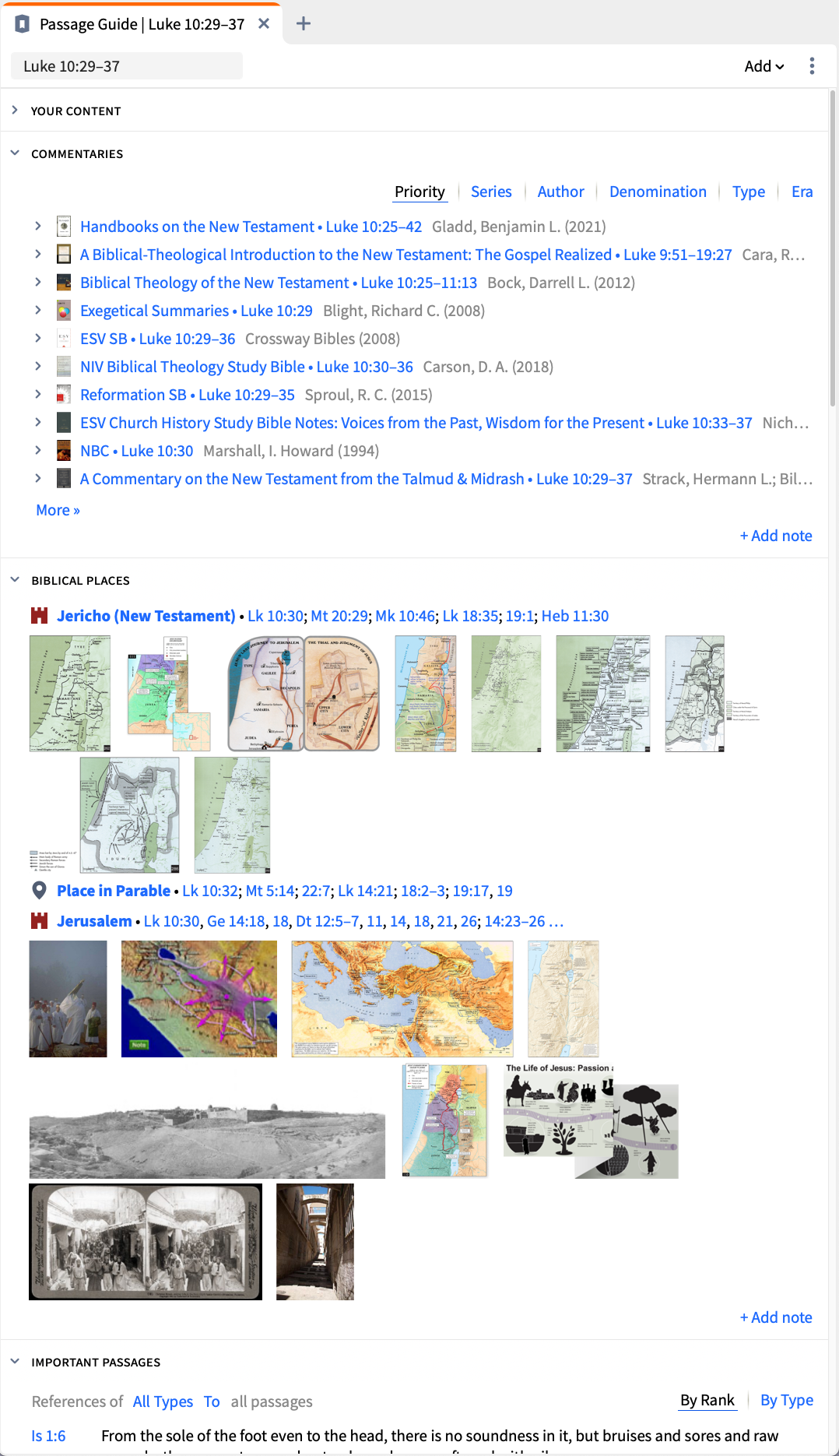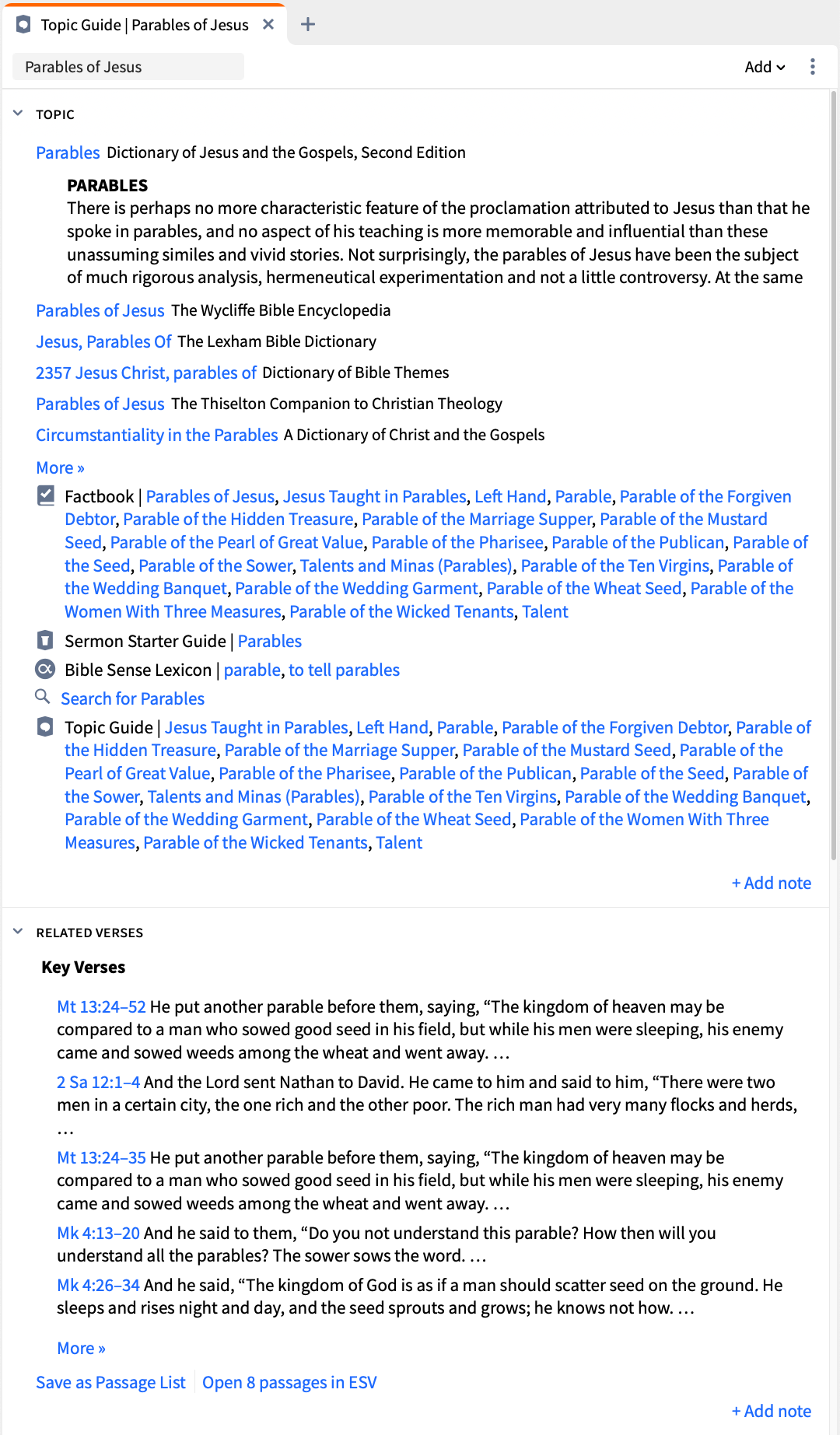Nothing gets to the heart of who God is more than his generosity.
From the first chapters of Genesis—when God creates the world for humanity to steward—to the last chapters of Revelation—where God recreates the world for humanity—God gives. God gives grace. He gives companionship. Ultimately, God gave his Son to redeem creation from the prison of sin. Everything we have is a gift from him. The Bible tells us, “God is love” (1 John 4:8). At the heart of God’s all-encompassing love is his generosity.
Therefore, as we seek to lead people to understand and reflect God’s heartbeat, we must teach them to give as God does.
Lord, help me be generous
This sermon series package will use three of Jesus’s parables to help teach your congregation how to be generous and faithful stewards of their time, talents, and treasures. All of them start with a well-worn biblical principle of stewardship: everything we own comes from God.
In this sermon kit, you’ll find:
- Sermon outlines for three weeks of weekend messages
- Sermon fill-in notes so your congregation can follow along as you preach
- Small group studies that correspond with each week’s sermon
- Additional resource suggestions to aid your study and sermon preparation
- Slides for each sermon so your congregation can see your important points and the Scripture you’re referencing
- Social media quotes to help you promote the sermon series in your community.
- Impactful quotes on the subject of generosity to spark inspiration.
We pray this resource will help your congregation give like God gives.
Table of contents
Week 1: Generous with Your Time (Luke 10:25–37)
Sermon outline
Summary
Everything we have is a gift from God, even the hours in our day. God wants us to use our time not just for our benefit but for his glory.
Jesus’s parable of the good Samaritan shows us two negative examples of how we might use our time (the priest and the Levite) and one positive example (the good Samaritan).
I. How God looks at time
- God created it (Gen 1:4–5).
- Our time is limited (Job 14:5).
- God wants us to use the time he gives us for his glory (1 Cor 10:31).
II. The good Samaritan (Luke 10:25–37)
A. 2 key questions
- How do I get eternal life? Jesus sums up the entire law with Deuteronomy 6:5 and Leviticus 19:18.
- Who is my neighbor? (Or how do I show love to my neighbor?) Jesus responds with a story.
B. The story
- A man is on his way from Jerusalem to Jericho when he falls into the hands of robbers.
- A priest passes by the injured man.
- A Levite passes by the injured man.
- A Samaritan uses his time generously.
C. The Samaritan’s response
- The Samaritan bandages the man’s wounds.
- The Samaritan puts the man on his own animal and takes care of him.
- The Samaritan pays for an innkeeper to care for the man until he can return.

As you prepare your message, use Logos’s Passage Guide to study Luke 10:29–37. Get it free, if you don’t already have it.
III. How do you use your time generously?
A. You must care
- The good Samaritan showed compassion.
- God the Father regularly demonstrated compassion (Ps 78:38).
- Jesus demonstrated compassion (Matt 14:14).
- The Bible tells us to do likewise (Col 3:12).
B. You must do something (1 John 3:16–17)
God’s love moved him to “send” his Son. In other words, it’s not enough to just care about others. You must act on your compassion and use your time to help them.
C. You must partner with others (Eccl 4:9–12)
- The good Samaritan enlisted help from the innkeeper.
- You’ll multiply your efforts when you work with people in your local church to help others.
Fill-in notes
I. How God looks at time
- God _____________ it (Gen 1:4–5).
- Our time is _____________ (Job 14:5).
- God wants us to __________ the time he gives us for his ________ (1 Cor 10:31).
II. The good Samaritan (Luke 10:25–37)
A. 2 key questions:
- How do I get __________ life?
- Who is my __________?
B. The parable:
- Man is on his way from _________ to ______________ when he falls into the hands of _____________.
- A ___________ passes by.
- A _____________ passes by.
- A ____________ uses his time __________.
- The Samaritan ___________ the man’s wounds.
- He ___________ for an __________________ to take care of him until he can return.
III. How do you use your time generously?
- You must ___________.
- You must _____ ____________.
- You must ________ with others.
Small group guide
Opening questions
- Who in your past had the biggest influence on how you use your time?
- When you look at your daily schedule right now, what thoughts come across your mind? Does it bring you stress, excitement, worry, etc.?
Getting into the text
- The text says that the lawyer wanted to “justify himself” by asking, “Who is my neighbor?” Why do you think he was trying to justify himself?
- If you had never heard this story, who would you have guessed would have helped the injured person? The priest, the Levite, or the Samaritan?
- Why do you think the priest and the Levite passed by? What excuses do you think they had?
- What reasons do you think the good Samaritan may have had to pass by the injured man as the other two did?
- Why does the text say that the good Samaritan stopped to help?
- Besides time, what else did it cost the good Samaritan to help?
Applying the Bible to your life
- Of the three men who passed by the injured person along the road, which one do you think best represents the way you respond to the needs of others? Why?
- What keeps you from being more generous with your time?
- What is one way you could be more generous with your time this week?
Helpful resources
Luke (Zondervan Exegetical Commentary on the New Testament | ZECNT)
Regular price: $59.99
Week 2: Generous with Your Talents (Matt 25:14–30)
Sermon outline
Summary
All of us have been given gifts and talents to serve Jesus and his church. Just as we are to be good stewards of our resources and our time, God expects us to use our talents to do his work in the world.
As we’re obedient to do our best with what we’ve been given, the Lord may enable and multiply our work.
I. You were created to contribute
As Rick Warren says in The Purpose Driven Life,
You were put on Earth to make a contribution. You weren’t created just to consume resources—to eat, breathe, and take up space. God designed you to make a difference with your life. While many best-selling books offer advice on how to ‘get’ the most out of life, that’s not the reason God made you. You were created to add to life on Earth, not just take from it. God wants you to give something back.
- We all have a hunger inside of us to make a difference in the world around us.
- Too often we think about our contribution as something extra we do in the world. But our talents and abilities are gifts God gives for us to steward. Stewarding our gifts is one of the great privileges and responsibilities of the Christian life.
II. The parable of the talents (Matt 25:14–30)
A. A man gives each of his servants talents to invest
- He gives the first servant five talents.
- He gives the second servant two talents.
- He gives the third servant one talent.1
Generally speaking, this parable is about stewardship. Its lessons can be applied to anything God gives us to manage. For the purpose of this sermon though, we’ll look at what God wants us to do with the abilities he gives us.
B. The servants used their talents differently
- The first servant invests five talents and earns five more by investing them.
- The second servant invests two talents and earns two more by investing them.
- The third servant receives one talent and buries it. He earns no more talents for his master.
C. The master praises the first two servants and rebukes the third
III. Lessons from the parable of the talents
A. God gives gifts to everyone (Rom 12:6–8)
- The master gave each servant in the story a gift (Matt 25:15).
- You might not feel like you have anything to contribute, but you do.
B. God doesn’t give the same gifts to everyone
- The master gave a different number of gifts to each servant (Matt 25:15).
- Not everyone receives the same gifts from God (1 Cor 12:4–11). Furthermore, we receive different intensity of gifts; some people are more gifted than others. Yet the number and kind of gifts you’ve been given don’t make you more or less valuable in God’s eyes or the church.
C. God wants us to use the gifts we’ve been given (1 Pet 4:10–11)
- The master honored those who used what he gave. He rebuked the one who did not (Matt 25:21–26).
- The Bible says God prepared good works ahead of time for us to complete (Eph 2:10).
- God urged Timothy not to neglect the gift he had been given (1 Tim 4:14).
D. We’ll face consequences for stingy use of the gifts we’ve been given
- The lazy servant lost the talent he was given (Matt 25:28–29) and was thrown into “the outer darkness” (Matt 25:30).
- We face consequences when we don’t use our talents effectively. We miss the blessings that come from service, we don’t get opportunities for greater service, and other people face consequences for our failure too (e.g., people don’t get reached, the hungry don’t get fed, the lonely don’t get visited).
E. When you invest your talents, God will multiply them
- The faithful servants doubled their master’s investment (Matt 25:20–23, 29).
- God will do far more through you than you can imagine when you use your talents to honor him.
Fill-in notes
I. You were created to ___________
II. The parable of the talents (Matt 25:14–30)
A. A man gives each of his servants talents to invest
- The first servant gets _______ talents.
- The second servant gets _________ talents.
- The third servant gets ___________ talents.
- A talent was worth about _____ pounds and more than ________ ________ of wages for the average laborer.
- Generally speaking, the parable is about ____________.
B. The servants used their talents differently
- The first servant ________ his talents and earns ________ more.
- The second servant ________ his talents and earns __________ more.
- The third servant _________ his talents and earns ___________ more.
C. The master praises the first two servants and rebukes the third
III. What the parable of the talents teaches us
- God gives ________ to __________ (Matt 25:15).
- God doesn’t give the _______ gifts to everyone (1 Cor 12:4–11).
- God wants us to _________ the gifts we’ve been (1 Pet 4:10–11)
- We’ll face ___________ for ____________ use of the gifts we’ve been given (Matt 25:28–30).
- When you _______ your talents, God will _________ them (Matt 25:29).
Small group guide
Opening questions
- What do you think are some of the biggest lies people have about their abilities, talents, and gifts?
- What are some of the gifts and talents you’ve used throughout the years in ministry at church or in the community?
- What are some gifts you’ve never used but you would like to?
Getting into the text
- Why do you think the master gave the servants different numbers of talents?
- Do you think the master seems harsh in his treatment of the servant that didn’t invest his talents?
- How would you describe the difference in mentality between the servants who invested their talents and the one who didn’t?
- How do you think the third servant’s perception of the master impacted his decision not to invest his talent?
- Is it fair that God only gives more to those who use what he has given them? Why or why not?
Applying the Bible to your life
- What is your biggest obstacle to using your talents for Jesus’s sake?
- What talents do you need to invest more heavily into kingdom work?
- What is one step you can take this week to invest your talents more faithfully in God’s work?
Helpful resources
The Expositor’s Bible Commentary, Revised Edition, Volume 9: Matthew–Mark (REBC)
Regular price: $52.99
The Gospel of Matthew (The New International Commentary on the New Testament | NICNT)
Regular price: $59.99
Matthew (Zondervan Exegetical Commentary on the New Testament | ZECNT)
Regular price: $64.99
Week 3: Generous with Your Treasures (Luke 16:1–13)
Sermon outline
Summary
Every dollar in your pocket comes from God. We are all called to steward our money generously by investing it in what will outlast us.
In the parable of the unjust steward, we’re taught to be shrewd with our money and use what we have to make an impact upon eternity.
I. How you spend your money matters
- As has been shared throughout this series, all you have is a gift from God. Your money is one of those gifts.
- Whether you have a lot or a little, God expects you to generously invest what you have for eternal good.
- How you spend your money is the barometer of your heart (Matt 6:21).
Oswald Chambers writes about Matthew 6:33 in My Utmost for Your Highest,
Immediately we look at these words of Jesus, we find them the most revolutionary statement human ears ever listened to. “Seek ye first the kingdom of God.” We argue in exactly the opposite way, even the most spiritually-minded of us—”But I must live; I must make so much money; I must be clothed; I must be fed.” The great concern of our lives is not the kingdom of God but how we are to fit ourselves to live. Jesus reverses the order: Get rightly related to God first, maintain that as the great care of your life, and never put the concern of your care on the other things.
II. Background to the parable of the unjust steward
A. What this story doesn’t teach us
- It doesn’t teach us that it’s right or good to cheat people out of money. The Bible clearly teaches that making money in deceitful ways is sin (see Prov 21:6).
- It doesn’t mean that money itself is evil. 1 Timothy 6:10 says that the love of money, not money itself, is the root of all kinds of evil.
B. How the landowner system worked in Jesus’s day
- The landowner hired a manager to manage the land for him.
- Rent was often calculated “in-kind” (giving gifts like wheat, etc.).
- The manager typically added his own commission—that was his salary.

Study the parables of Jesus using Topic Guide in Logos. Get it free, if you don’t already have it.
III. What the parable of the unjust steward teaches about money
A. God owns it all
- The Bible clearly teaches that God has authority over everything.
- The first few verses of Genesis attest to the fact that God created everything. Without God, there would still be nothing. This idea is reiterated in the New Testament (Col 1:16). Stewardship begins when we realize all God has made, all that we own, and all that we are, are his.
- The landowner owned all of the land. In the end, everything is his, though he gives the manager responsibility over it. This is a picture of what God does, entrusting things to us.
- This includes our money. God gave us the ability to earn our money (Deut 8:18). Money isn’t evil (again see 1 Tim 6:10). Rather, money is a tool we are given to use for God’s purposes. More than any story in the Bible, this parable speaks to this truth.
B. God has entrusted us with what he made
- The landowner entrusted the land to the manager (Luke 16:1).
- After he created the earth, God made man its manager (Gen 1:28–31).
- As we’ve discussed in this series, God entrusted us with all we have (time, talent, and treasures).
C. We are to use what he has given us for kingdom purposes
- This is the main point of the parable. Jesus is telling the disciples that they need to use what he has given them for kingdom purposes (Luke 16:9).2
- The question really is: Will we use what we have for things that have eternal value?
- Our financial resources are a gift from God. David acknowledged this as he prepared Solomon and the people of Israel to build the temple (1 Chron 29:14–16). Generosity comes when we realize we’ve been entrusted with the Lord’s resources and we’re to use them for his purposes.
D. We are to use what we have wisely
- The landowner praised the unjust steward for managing what he had been given wisely (Luke 16:8).3
- God wants us to act wisely and use what he has given us intelligently. Are you using what God has given you wisely and generously? Or are you just sitting on it?
- The wisest, most significant thing you can do with your resources is generously pour them into causes that will outlast you. William James once said, “The greatest use of life is to spend it on something that will outlast it.” The same is true with our money.
E. There will be an end to our opportunity to be generous
- The manager’s time was limited—he would soon be left out in the cold. He had to act immediately.
- One day, death will come to you. Hebrews 9:27 reminds us of this. You have no idea when that day will come.
- Show a stopwatch. Say, “You have a limited time to make a kingdom-sized difference in this world through your generosity. The time to be generous isn’t tomorrow. It’s today.”
- Illustration: In the movie Schindler’s List, businessman Oscar Schindler arranges to protect his workers from being murdered during the Holocaust. He saves more than 1,100 people from death. But in the movie’s final scene, he is haunted by how many more people he could have saved if he would have spent his money differently.
- The manager in this parable prepared for his end. He did so by making friends that could be a part of his life when he no longer had a job.
- We all should live with the realization that our life on earth is limited. We need to make the most of the time we have and use it to prepare for eternity.
Fill-in notes
I. How you spend your money matters
- All you have is a __________ from God. Your money is one of those _____________ of God.
- God expects you to ___________ what you have for eternal good.
- How you spend your money is a _________ of your heart (Matt 6:21).
II. Background of the parable of the unjust steward
- It’s __________ to cheat people out of money.
- Money is not __________.
- The landowner hired a _______ to _________ the land for him.
- Rent was often calculated _______.
- The _________ typically added his own __________.
III. What the parable of the unjust steward teaches us about money
- God ________ it all (Col 1:16).
- God has _________ with what he made (Gen 1:28–31).
- We are to use what he gives us for ________ purposes (1 Chron 29:16).
- We are to use what we have ________ (Luke 16:8).
- There will be an ______ to our opportunity to be __________ (Heb 9:27).
Small group guide
Opening questions
- What are some of the lessons your parents taught you about money?
- What fears do you have about money that influence how generous you choose to be?
Getting into the text
- Why do you think Jesus, in his parable, uses a manager who is cheating their employer out of money?
- What are some of your perceptions of the unjust steward? Is he someone you’d like to be in charge of your finances?
- Do you think it’s still true that worldly people tend to be shrewder about money than Christians? Why or why not?
- Luke 16:11 (ESV) says, “If then you have not been faithful in the unrighteous wealth, who will entrust to you the true riches?” What do you think are the “true riches” described here?
- The last verse of the passage (Luke 16:13) says that you can’t serve two masters. How do people attempt to serve both money and God? How does that usually work out?
Applying the Bible to your life
- Why do you think it’s wise to be more generous?
- What keeps you from being more generous with your money?
- What is one step of faith you can take this week that will lead to greater generosity in your life?
Helpful resources
Counterfeit Gods: The Empty Promises of Money, Sex, and Power, and the Only Hope that Matters
Regular price: $13.99
Sermon slides
Download a free bundle of sermon slides for this series here.
Social media posts
Week 1
You’ll never have enough time until you learn to give it away.
Join us this Sunday at [time] as we look at what the Bible says about being generous with your time!
—
You have 168 hours every week and 8,736 hours every year. What are you doing with the hours you have?
If you have an average lifespan, you’ll live 27,375 days—and then you’re done. At that time, your opportunity to make a difference in this world will end. Whatever your age, it’s time to take the first step in making the most of the days you have left.
Join us this weekend as we see what the Bible says about being generous with our time!
—
What could God do through YOU if you gave him your 168 hours this week?
[This weekend!] Be generous with your time.Week 2
You were not put on this planet to just take up space, eat, sleep, live, and die. You were created to contribute. We’d love for you to be our guest this Sunday as we look at what the Bible says about how you can use the talents God has given you to make a difference around the world.
—
At [your church name], we believe every person on the planet was created to contribute. That includes you! Find out how.
[You’re invited!] Worship with us this weekend!—
You are a unique mix of personality, gifts, skills, and talents. How you use that unique mix will determine the contribution you make in this world.
This Sunday, we’ll look at what God says about using your talents generously to impact the world.
Week 3
God blesses us so we can bless others. Find out how God can use the resources he has given us to help people all around the world.
[This weekend!] Learn the Blessing of Generosity—
How can God use your resources to make an impact all over the world? Find out this weekend.
—
God doesn’t give us resources for our own comfort and pleasure. We’re blessed to be a blessing!
Join us this Sunday as we take a look at what God’s Word says about using our resources to honor God.
10 inspiring quotes on generosity
“Where grace happens generosity happens.”
—Max Lucado
“Sometimes, we need only to look at the sunrise to see the generosity of God.”
—Jocelyn Soriano
“No one has ever become poor by giving.”
—Anne Frank
“Attention is the rarest and purest form of generosity.”
—Simone Weil
“We make a living by what we get, but we make a life by what we give.”
—Winston Churchill
“The more you give, the more comes back to you, because God is the greatest giver in the universe, and he won’t let you outgive him. Go ahead and try. See what happens.”
—Randy Alcorn
“God made all of his creation to give. He made the sun, the moon, the stars, the clouds, the earth, the plants to give. He also designed his supreme creation, man, to give. But fallen man is the most reluctant giver in all of God’s creation.”
—John MacArthur
“It is possible to give without loving, but it is impossible to love without giving.”
—Richard Braunstein
“If a person gets his attitude toward money straight, it will help straighten out almost every other area in his life.”
—Billy Graham
“I do not believe one can settle how much we ought to give. I am afraid the only safe rule is to give more than we can spare. In other words, if our expenditure on comforts, luxuries, amusements, etc., is up to the standard common among those with the same income as our own, we are probably giving away too little. If our charities do not at all pinch or hamper us, I should say they are too small. There ought to be things we should like to do and cannot do because our charitable expenditure excludes them.”
—C. S. Lewis
“Extravagant love, as in every generation before us, has been ridiculed and scorned. It is seen as wasteful and reckless overspending. But extravagant love, the offering of everything, the emptying of the pockets of our life, is the essence of true Christianity.”
—Eric Ludy
“You have not lived today until you have done something for someone who can never repay you.”
—John Bunyan
“If you can’t feed a hundred people, then feed just one.”
—Mother Teresa
Further resources on generosity and stewardship
Mobile Ed: PD331 Wealth and Stewardship in the Bible: A Practical Guide (7 hour course)
Regular price: $259.99
Related articles
- 10 Bible Verses about Generosity
- The Attributes of God: Who God Is & Why It Matters
- 8 Reasons I Use Logos for Sermon Preparation
- A talent was a large measure of money. One talent weighed about seventy-five pounds and was worth more than twenty years wages for the average laborer.
- The NIV translates “unrighteous wealth” as “worldly wealth,” or more generally, all the things of this world that pass through our hands.
- “Astute” or “shrewd” means wise. It’s a word used in Matthew 7:24 to describe the man who built his house on the solid rock (of Jesus). It’s also used in Matthew 10:16 to describe how Jesus sent out the disciples on mission.





